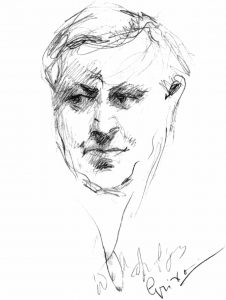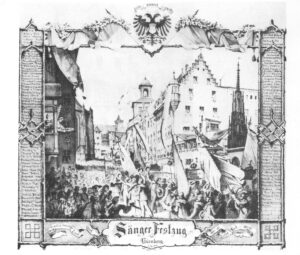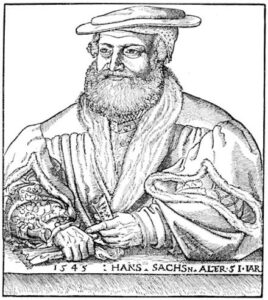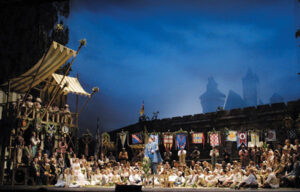[On October 26, The Metropolitan Opera in New York City brings back its much-loved production of Die Meistersinger von Nürnberg for six performances, including one Saturday matinee and two Sunday matinees. That’s the reason for this post.]
This blog is usually referred to as my “personal” blog, and that’s certainly true in this case, for I’m anxious to share something that is very important (and perhaps very personal) in my life.
While I’m not German, and German has never been a language I could master (despite several serious attempts), for years I’ve been wanting to let others – especially people I know and care about – learn something about the joy Richard Wagner’s great masterpiece Die Meistersinger von Nürnberg brings to my life.
GUY’S MEISTERSINGER FEST I – GUY MEETS DIE MEISTERSINGER
For years – going back just shy of fifty years, to be exact – there’s been a special place in my music-listening schedule for Die Meistersinger von Nürnberg. On January 15, 1972, I was taken to the Metropolitan Opera for the Saturday matinee. My host was the great American architect Ralph Walker, now known for his contribution to the New York City skyline with grand buildings designed in what became known as Art Deco style. [In 2014, he was written about here and here in this blog.]

(1889–1973)
Sketch from: Architects and Artists.com
Walker was the Chairman of the Library and Art Committee at the Union League Club of New York, where I was employed at the time. He had taken a great interest in me, and as he and Mrs. Walker were very caught up in the cultural life of the city, they were very happy to share their own enthusiasm with me, as they came often into the city from Chappaqua for performances and museum visits. On this January Saturday Mrs. Walker was not able to join her husband for the matinee, and I was invited. The afternoon with Mr. Walker changed my life.
I had been to the opera often before that day in 1972, and when first arriving in New York in 1968 and learning that such musical joys were on offer, I became a fan, even more than I had been earlier in my life. In fact some might say that in those early New York days, I became somewhat addicted.
As the performance began, I could not describe what was happening to me, but I knew there was an impact as I listened to the music. I was hoping to understand the sequence of events on stage, and I had made sure to read the libretto (we did not have subtitles at the opera in those days) before before Mr. Walker and I went for lunch before the performance.
But once the music started, I knew – felt – that there was something coming over me, something that I had not experienced before. I wondered if it was something like some sort of intellectual breakthrough, but that idea didn’t seem to work, and I certainly couldn’t articulate that sensation once we were in the opera house and I was sitting there listening. Perhaps it was something else I couldn’t understand, perhaps simply some form of inspiration, but that would have been too easy. I had long sung – and was still singing – great choral music, and at that time I was a baritone in New York’s famous choir at St. Bartholomew’s Church. With the high level of sophistication in the selection of music performed in that serious musical establishment, I was provided with plenty of choral inspiration (and musical education as well, sometimes intimidating but valuable nonetheless).
Yet what was happening to me at this first Meistersinger performance could not be readily described. It was having an effect, unlike anything I had known before. The opera, after all, is generally considered Wagner’s greatest work, a consideration with which I agree (although – as I learned later – it is a consideration that leads to intense discussions among all sorts of opera fans).
Die Meistersinger von Nürnberg has been – certainly since the early 1930s – a controversial work of art, and that controversy and all that has been written about it also seemed to speak to me. The story, too, attracted me and gave me much to think about. It is, after all, fundamentally concerned with the importance of music in our lives. Could anything else have been more important to Guy St. Clair? And there is one other aspect of Meistersinger that needs to be mentioned, though I fear that it might scare you off. At more than five hours long, it is Wagner’s longest opera. It is, however, often considered his greatest opera (certainly so considered by me).
And even at this first performance, as Ralph Walker’s guest, I was thrilling to the sounds I was hearing. It never occurred to me to dislike what I was listening to. Or, in a larger sense, what I was experiencing. Of course I couldn’t help but wonder if it was simply because this occasion was my first exposure to the music (although I must have heard the famous Prelude at some time, on the radio, in symphony concerts, and similar performances) but those hearings had not ever led to the reaction I was having this Saturday afternoon.
So it must have been more than the music alone that I was feeling. As the afternoon moved forward, even though I couldn’t find the reasons I was looking for, I was thoroughly caught up in what I was hearing and seeing. And I was becoming aware that what was happening was something new to me. It was the embodiment of what I would later learn to be probably the most meaningful of Wagner’s ideas, his concept of the Gesamtkunstwerk or “total work of art.”
Wagner generally wrote both the libretto and the music for his works, and as he began to enlarge on what is usually listed as “the poetic, visual, musical, and dramatic arts” for his “music dramas” – as his later works were known – everything was designed to come together in one unified theatrical event. I had not known this before, even though I had heard several of Wagner’s other operas once I moved to New York, but this performance was the one that brought it all home to me. It helped me to understand about how – even when a person was as problematic as we have all come to know Richard Wagner to have been – his contribution to art and to the arts relating to opera as an art form was a major contribution and – with respect to his designation of opera as an all-embracing art form – one that has enabled all of us who love music to come to a new understanding of opera.
GUY’S MEISTERSINGER FEST II – SO MUCH TO EXPERIENCE

(Germanisches Nationalmuseum, Nuremberg) Royal Opera House Program April 9, 1990
I’ve set my story up as a “Fest” – a celebratory occasion in which I could bring in bits and pieces of some of the many productions with which I had become familiar. In addition to having attended several outstanding live performances over the years, listening to them on the radio, or seeing them on television, many performances of this grandest of grand operas are now available on (mostly old) recordings, on DVDs, and, notably, on films via online streaming, this last thanks to the efforts of opera companies seeking to assure continued programming as the 2020/2021 COVID-19 pandemic shut down performance venues.
So it was with Die Meistersinger von Nürnberg, and as I discovered with some carefully concentrated searching, I could find performances from all over the world. Suddenly, in addition to the recordings, CDs, and DVDs I had available, the opera was being streamed from San Francisco, Glyndebourne, London, Berlin, Vienna, Milan, Amsterdam, Tokyo, and several other places, including the Bayreuther Festspiele. Additionally, another remarkable resource for complete video performances of Die Meistersinger (and many (excerpts) is YouTube.
All of these came into our house over the years and, generally speaking, have been musically satisfying. And while – in the performances I was viewing – I had to look away at occasional absurdities in some of the productions, I was never let down by the musical standards in any of the locations I was able to connect with. And despite the intentions of most of us who agree enthusiastically with Wagner’s concept of Gesamtkunstwerk, there’s no way to get around the sublime excellence of some of the performers I was able to hear sing in many of these productions.
And as I pursued my Meistersinger Fest – and I admit my prejudice – the “granddaddy” of them all is the current production we have in New York. I was an early subscriber to the Met’s subscription streaming services (Met on Demand), now with some 750 full-length performances from the Metropolitan Opera. All media are represented, including video, telecasts, and audio, and I was delighted to discover that the audio recording of the January 15, 1972, performance I heard with Mr. Walker is available, and to discover that I even had access to the one-page poster describing the performance. It was a different production then, having been created in 1962 by Robert O’Hearn and Nathaniel Merrill, and Thomas Schippers was the conductor. The current production – by Otto Schenk and Günther Schneider-Siemssen and conducted originally by James Levine – was premiered at the Met in 1993 and two very pleasing video performances are available on Met on Demand, as well as other live audio performances.
Having had such a good time with my 50-year connection, I cannot resist sharing some of what I’ve learned as we anticipate the up-coming performances here in New York. So I am sharing my own personal attraction to Die Meistersinger von Nürnberg and telling something about how that enthusiasm developed. Similarly, I want to offer what might be a blatant invitation to those who might like to join me in my love for the opera. And I want to share my gratitude about having been exposed to the many productions of the opera with which I’ve become familiar, so many that, in fact, I have learned a great deal about the many different styles and points of view incorporated into those productions.

Obviously, we must begin with the story – what is Die Meistersinger von Nürnberg about? Almost every opera house produces a playbill or program, and each of these contains a synopsis, a detailed outline of the plot designed to give each person attending the performance the sequence of events that take place or, in some cases, described as having happened (offstage) after or before the drama as it is performed on stage.
And attention to the synopsis of the opera is important. In addition to the synopsis, the various streaming services usually include both translations of the text being sung and a synopsis, and since I’ve already indicated my preference for Met on Demand, I find that the easiest way to get “into the spirit” of what I’m planning to watch and hear.
The quickest synopsis for this opera I’ve ever seen came from San Francisco, which with Glyndebourne (in 2011) and Lyric Opera in Chicago shared the production. Here’s that synopsis:
A young arrival to a new city, in pursuit of winning a singing competition as well as a beautiful woman, finds sympathy in a wise cobbler-poet.
But of course there is a real synopsis. With the San Francisco production, it’s here. The synopsis for the Met’s up-coming performances is here. Wikipedia also has a very fine synopsis for Die Meistersinger von Nürnberg and it is here and as a reading bonus, the entire Wikipedia entry provides much useful information about the history of the opera, a fascinating little essay on Wagner’s curiosity and use of Schopenhauer’s theories on aesthetics, with similar ideas and commentary making the Wikipedia text valuable for anyone, novice or experienced opera-goer.
When I undertook in recent years to describe my initiation to Die Meistersinger von Nürnberg, I was bothered by the fact that, with respect to operas like these, there seem to be any number of built-in prejudices (the opera’s length, difficulties with the language, even political situations from the opera’s history that turn some people away). My closest friend helped to make things easier, suggesting that what I was describing might better be thought of as an “experience,” an event, or even as “a happening.”
He also convinced me (it didn’t take much convincing) that it would help – when talking about the opera – to take the position that if it’s looked forward to like other “experiences” one can enjoy (travel, family gatherings, other artistic and/or performance events, and such), it might be easier to encourage others to participate and to come to the opera with me. That was clear reasoning, I thought, and it made a lot of good sense to me. With this idea connected to my description of Die Meistersinger, I felt I could move forward and share what I wanted to share with friends who might like to hear about my history with this opera.

Photo: Opera News, Metropolitan Opera Guild
Some people, when exposed to opera, find themselves enthusiastic about the art form very quickly, sometimes even from the first encounter. That, in fact, is probably a good way for describing what happened to me, especially after I moved to New York and had my first “serious” experiences with opera as an art form. For me, it was not unexpected since I was already familiar with music and had acquired a certain proficiency with music, focused on singing.
Others find themselves coming to opera to experience something new, having been encouraged to join this person or this group of people for an evening at the opera house. Often the situation is simply an opportunity that comes up when there’s an empty seat and someone offers a ticket. Other times, there’s an invitation from an enthusiast (probably someone like me) who can’t stop talking about how much enjoyment the visit to the opera house provides, and the invitee simply decides to see what all the excitement is all about.
While I may be endangering my membership in the Opera Fanatics Club (only kidding!), I have two last suggestions. First, listen to the Prelude to Die Meistersinger von Nürnberg, one of the most spectacular pieces of music ever written. Then think about what must follow such a memorable beginning. And second, if you’re watching streaming performances or listening to CDs or DVDs, keep in mind that you don’t have to do it all at one sitting. Take it one act at a time, or even in smaller portions, if you prefer, but however you watch or listen I suspect you’ll be hooked.
So let’s do it. If you are a New Yorker or if you are someone who will be in New York from later in October to the about the middle of November, take a chance. Let yourself go. Have the experience of Die Meistersinger von Nürnberg.
Leave a Reply